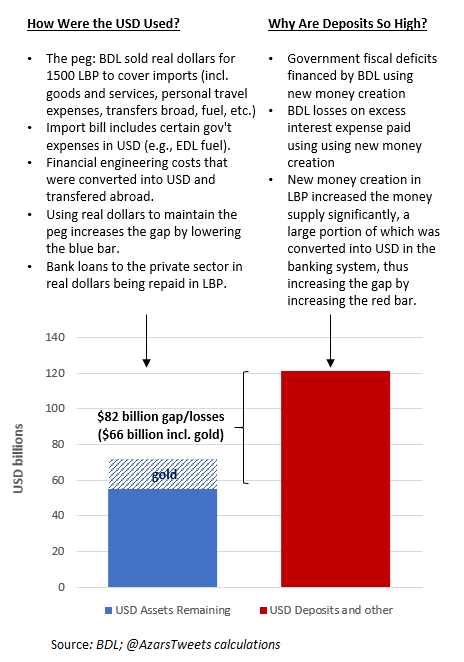
1/ Head of Budget and Finance Committee @IbrahimKanaan accuses unnamed Govt advisors/others of having purchased Credit Default Swaps (CDS) on Leb Eurobonds and then pushed for default to make a profit. Any trader could've explained to him why this is far-fetched had he only asked
2/ I suggest the MP hire advisers as these are technical topics and we can't keep wasting time on this nonsense over and over again.
While not my job, I did the research for anyone who's interested.
While not my job, I did the research for anyone who's interested.
3/ As most of you know, CDS is like an insurance product. The CDS Buyer gets paid out by the CDS Seller if there is a default on the bonds. To keep it simple, the Buyer pays the Seller a fee or premium to buy this insurance.
4/ The size of this fee indicates the market's view on the probability the bond will default. By Nov 2019, the premium was already pricing in a near certainty of default. That is, the free market, ppl with money on the line, expected that Lebanon will default because it's broke. 





5/ Not only that, the probability of default was so high that the CDS Buyer had to pay all of the fees upfront (ie "points upfront"). Usually a CDS Buyer can pay over the duration of the "insured" period. But when the risk is too high, the Seller asks for an upfront payment.
6/ Together, points 4 and 5 above, tell you that the price to buy CDS was so high by Nov/Dec 2019, before Diab's government took office, that it was nearly impossible to make a profit out of it. It was just way too expensive.
7/ That is, imagine you want to insure $10 million worth of Lebanese eurobonds. You'd buy a CDS and potentially have to pay upfront $6-7+ million because the Seller expects that these bonds will almost certainly default soon. There is no real profit margin.
8/ CDS also aren't instruments you can trade like stocks. Your average investor can't access this market. Big institutions can. You can't buy $500,000 of CDS. These are contracts typically above $10 million in size or more.
9/ Which idiot Govt advisor is going to pay this massive premium, risk losing all of this money, to make maybe a small profit, all while betting that the entire Lebanese political leadership will make a decision that none of us thought was even possible until Feb/March 2020?
10/ Most of the CDS bought and sold were hedges, part of package trades. @lebfinance has explained this. You OWN the bond and you PAY for CDS to insure it. This isn't speculation. It is real insurance, as you lose money on the bond and make up part of your loss with the CDS.
11/ What is being alleged is uncovered CDS buying, meaning the person doesn't own the underlying bond. They aren't hedging their exposure to the bond, but are speculating on default only. They risk losing the entire upfront fee, millions of dollars, to make maybe a small profit.
12/ The MP claims the unnamed advisors pushed for disorderly default in March so that their CDS would pay out. Had they not owned CDS, they may have pushed for an organized default. However, the CDS pay out in both scenarios... So the method of default is irrelevant.
13/ The risk/reward of this trade are so bad that if anyone actually managed to do it, I'd be more concerned that the Govt is hiring morons. They could've made more money on Gamestop.
14/ When Lebanese Banks dumped Eurobonds in Fall 2019, this likely created a growing market for CDS. Foreign investors/dealers were buying bonds that were likely to default and buying CDS insurance with them to hedge. This probably resulted in more CDS trading. See from 2018: 

15/ NOT EVERYTHING IS A CONSPIRACY.
16/ For those asking about MP Michel Daher who said on TV that he bought CDS in the past 👇🏽
https://twitter.com/AzarsTweets/status/1380917014982619138
• • •
Missing some Tweet in this thread? You can try to
force a refresh










